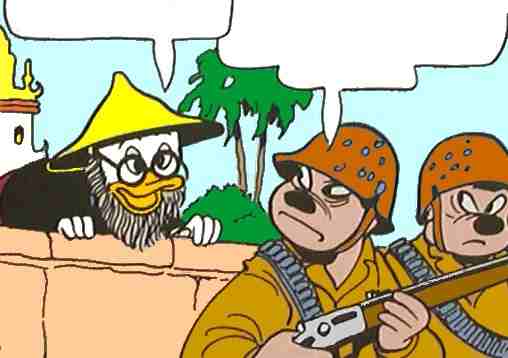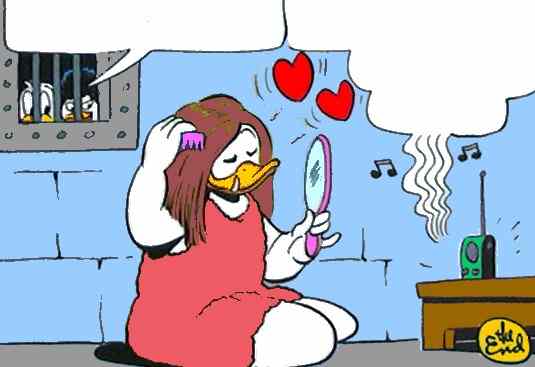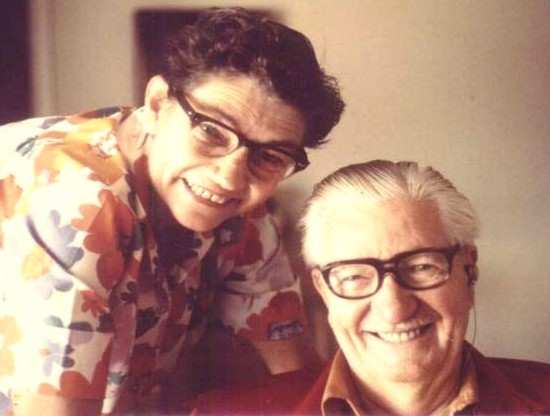

For the greater part of his life Carl Barks
had it made; he loved his comic book work, he was able to work
from his home, he had thousands of fans all over the globe, he
had a long and happy marriage with his third wife Garé, he was
able to pursue his painting hobby, he earned good money, and he
experienced good health. All these factors should assure that
Barks' attitude towards his life was of a prevailingly positive
nature - and they did!
Still, even in the best of lives you will find some gloomy points,
or, as Barks himself once put it: In each
life some rain should fall! And, like all
of us, he had his 'rainy' experiences, some of which lasted most
of his whole life. This is a page about some of Barks'
pessimistic views...
 U$64 |
Politics
(See more HERE.) All
of his adult life Barks was a registered Republican, i.e.
a conservative traditionalist, and most of the time he
looked disapprovingly at the way his country was governed:
I think a lot of the philosophy in my stories is
conservative. Conservative in the sense that I feel that
our civilization reached a peak around 1910. Since then
we've been going downhill. Much of the older culture had
basic qualities that the new type of stuff we keep
hatching up can never match. In 1999 an interviewer asked about Barks' attitude to war and U$64 Treasure of Marco Polo was mentioned. Barks commented on his views on war in general and the conflict in Vietnam three decades earlier: I get mad like everybody else at the stupid things people are doing in different parts of the world, but what could I do about it? I couldn't hire an army to go over there and kick somebody's butt. I realized that people were objecting to that war, and I felt that someplace we have got to stop the communists, or they're going to take over everything. It was something I couldn't do anything about... |
 U$62 |
Daily
life (See more HERE.) Barks would sometimes jump at the opportunity to satirize fads and crazes that occurred in contemporary times. Some of them even turned out to be long-lasting. Here are three examples of things he had little use for because of their stupefying influences: TV: Superheroes: Rock
music: |
 U$18 |
Environment
(See more HERE.) Barks was a concerned
environmentalist all of his adult life, long before the
term was even a household word. In his stories he would
occasionally add some of his views in more or less
disguised forms, but maybe his overall indignation of the
way we treat our planet was best expressed in a dialogue
between the chief of the Peeweegahs and Scrooge in U$18
Land of the Pygmy Indians: |
 WDCS271 |
Cheaters Barks nourished a certain mistrust - justified or not - to different groups of society. In his point of view nothing good would ever come out of these groups: Fast-talkers: Self-promoters: Charlatans: Lawyers: In
WDCS246 Lost Frontier Barks is really
letting steam out by letting Donald proclaim the
following after having been convinced that a certain
adventurer is a fraud: That Captain Gadabout is a two-bit
fraud! A pernicious prevaricator! A Prince of hokum, and
high hipster of hogwash! |
 Garé and Carl in 1973 |
Family
life (See more HERE.) Barks
was never a family man! His comic book work meant more to
him than having a normal family life and associating with
relatives. Only
when Barks had reached middle-age he found the right wife
with the same basic spirits as he had; Garé was also an
artist and she was equally engulfed in her work. They
were both helping each other and learning from each other,
and for the first time Barks settled down in a
conventional marriage which would last and grow until the
end. |
| http://www.cbarks.dk/THEPESSIMIST.htm | Date 2007-08-12 |